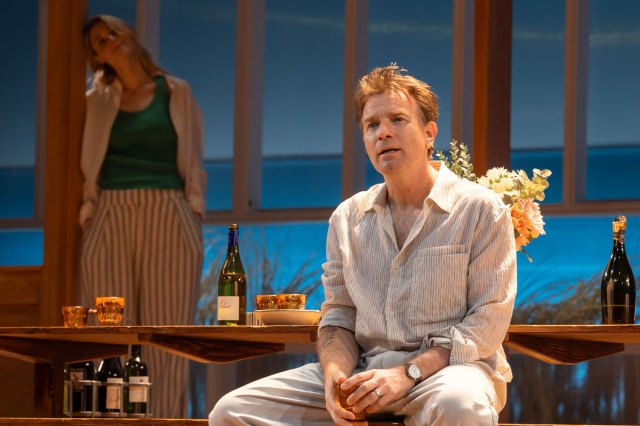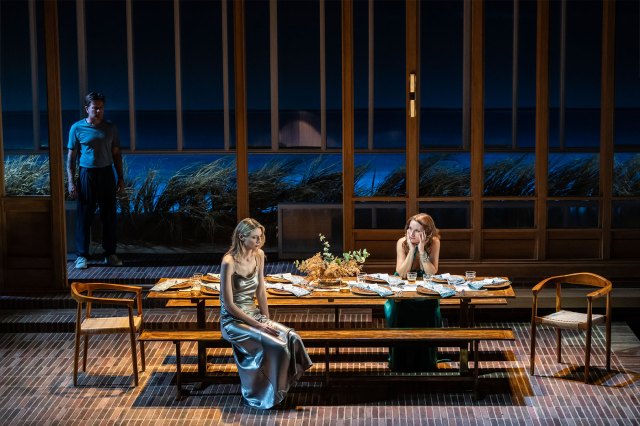My Master Builder review – Ibsen spin-off with Ewan McGregor is ill-constructed
Michael Grandage’s production of Lila Raicek’s new play, inspired by Ibsen, continues at Wyndham’s Theatre until 12 July

There’s something about Henrik Ibsen. For whatever reason, the plays of a bearded Norwegian who died in 1906, are seen as constantly relevant today. Hot on the heels of an updated revival of Ghosts by Gary Owen, which transplanted a tale of abuse to a contemporary setting, comes this modern take on The Master Builder, starring the appealing trio of Ewan McGregor, Elizabeth Debicki and Kate Fleetwood.
The play, written in 1892, when the 64-year-old playwright was in the throes of a brief affair with an 18-year-old admirer, and while he was still besotted with the much younger Hildur Andersen, has always been problematic. It may be full of important themes about egotism, art and ambition, but it often comes over as the priapic outpouring of a man who felt his own power draining away and so wrote a play about an architect inspired by a young student.
New York-based playwright Lila Raicek, whose West End debut this is, has attempted to solve some of its problems by a version that is not so much an updating as a rethinking. The intention is clearly to turn Ibsen’s musings on male creativity and potency into a more relevant discussion of sexual politics. She keeps the characters though renames them slightly, and puts much more emphasis on the role of Solness’s wife Elena who invites the student Mathilda (Hilda in the original) to a party for the inauguration of a new chapel he has built.

The setting is the trendy Hamptons, with Richard Kent’s evocative set showing windswept beaches fringed with rye grass beyond a long picture window. A frontispiece of tiered crystal gives Solness – who is scared of heights – a staircase to climb as he unveils his conversion of an old whaling chapel as a “sanctuary for meditation and therapy” with its spire offering a “star shafted portal from life into the celestial afterlife.”
The clothes and mores of the Long Island artistic classes are perfectly observed and the social satire of the early exchanges are sharp and quite funny, as the assorted guests arrive including Solness’s overweening protégé Ragnar (David Ajala), who is enticed to go swimming in tight budgie trunks and who is conducting an affair with Elena’s beleaguered assistant Kaia (Mirren Mack, lovely but with too little to do) while also fending off Elena’s advances.
But once Debicki’s elegantly mournful Mathilda turns up, and starts talking about her love for Solness, things take a difficult turn. There are a lot of meaningful gazes, and posturing speeches about the memory of desire, and “the unspoken fantasy between us” and “the bright star in the dark tunnel of my life.” There’s one cleverly observed line about the way younger women having affair with older men fold themselves into the space left behind, but on the whole the conversation is both dense and wordy.
The language constantly strives for the poetic but becomes impossibly stilted, leaving the actors making speeches at each other rather than interacting. McGregor in particular, making his return to the London stage after 17 years, seems desperately uncomfortable. Massively charismatic and in the past so fluent, here he is reduced to barking lines like orders, while Debicki has very little to do except gaze winsomely at him.
Only Fleetwood thrives, endowing Elena with a fierce energy, her eyes narrowing as she contrives her moment of reckoning. But in trying to reshape the play and give the women some agency, Raicek simply creates new problems. Elena, apparently grieving for her dead son, is portrayed like a hard-bitten bitch. Why has she tried to ruin Mathilda rather than her husband? Why has she waited so long to provoke a crisis? For all Fleetwood’s efforts, neither her love nor her rage have convincing motivation.
The reworking doesn’t work. As the evening progresses, it becomes so weird and distancing that it is hard to care about its outcome. Michael Grandage directs with his usual care, but it’s difficult to see what attracted him or any of these fine actors to a piece that fails to deliver.
















